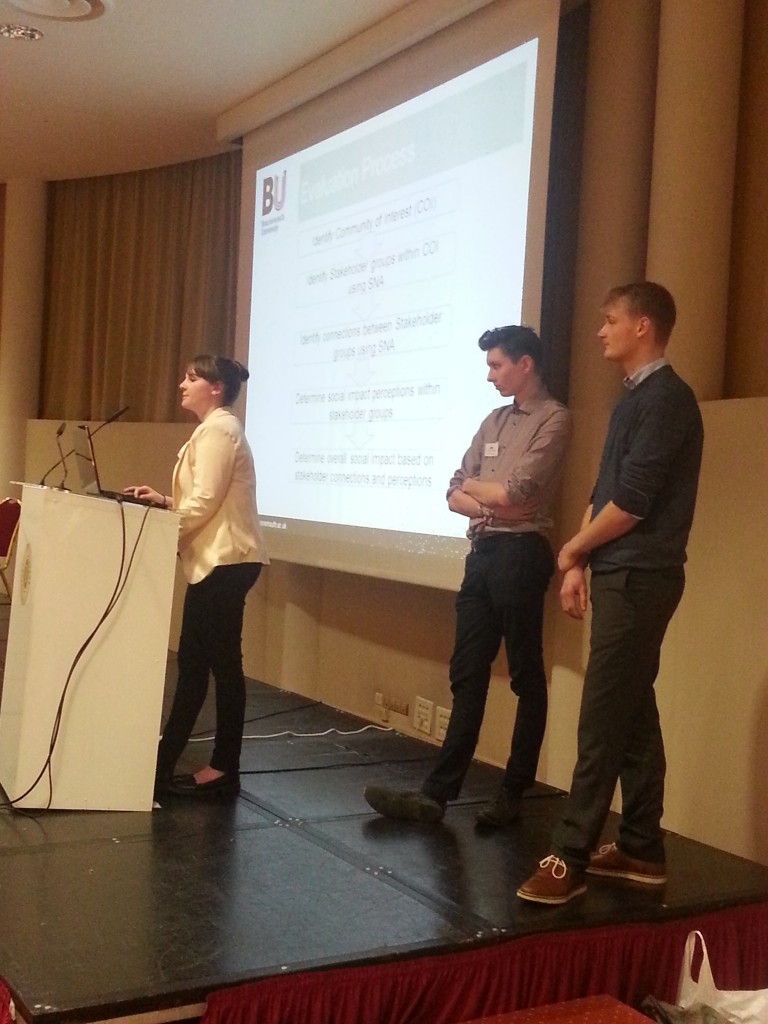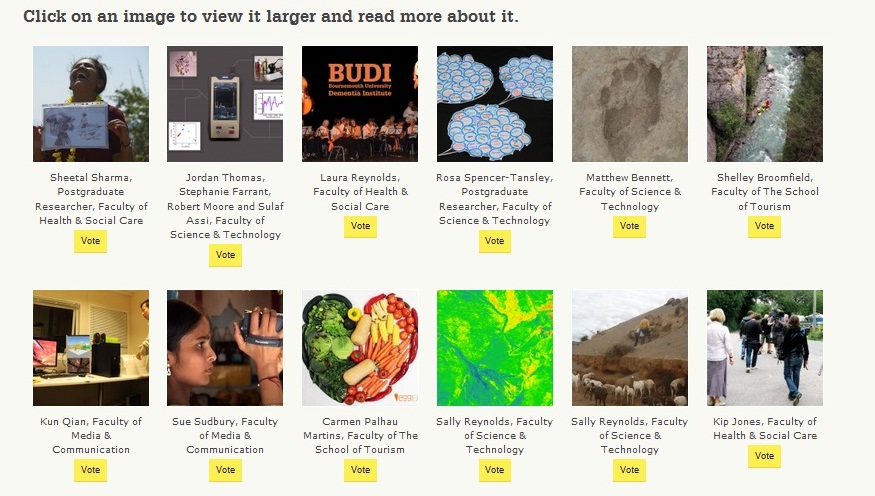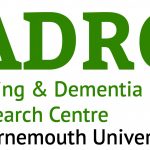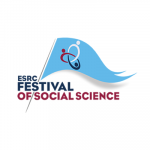RKEO has a number of posts that directly support colleagues in the Faculties with bid preparation and submission and the post-award management of grants and contracts. These staff members spend approximately 50% of their time based in the Faculty offices. Information on when and where you can expect to find them when they are working in your Faculty is available here on the Research Blog here: http://blogs.bournemouth.ac.uk/research/contact/faculty-facing-staff/.
/ Full archive
Creative and Digital Business Briefings are out now!
The March edition of the monthly creative business briefing for the UK’s creative industries is now live!
This is a monthly publication that provides a digest of useful information about funding, financing, support and events to assist creative entrepreneurs with their innovation and growth agendas. This month’s edition offers edited highlights of a number of public funding programmes from leading organisations supporting our sector including: Innovate UK, IC tomorrow, Nesta, British Film Institute, Creative England, Creative Scotland & more.
Now in it’s sixth month of publication, feedback from you the community continues to inform us that this is a valued resource.
Speakezee – new platform bringing together event organisers and academic speakers

A new platform has been launche that brings together event organisers and academic speakers http://www.speakezee.org/
Researchers can create a profile and add a video of a public talk if they wish. After only 3 weeks live there are more than 400 academics from across the UK.
Speakezee has been started by University of Bristol academic, Professor Bruce Hood, but is not an official University project. It is a UK service open to everyone from every University. Bruce hopes to achieve country-wide coverage.
Research Funding Opportunities
Short-term constitutional change knowledge exchange leadership fellowships
Economic and Social Research Council, GB
The ESRC invites expressions of interest (EOI) for up to four short-term Knowledge Exchange (KE) Leadership Fellows around issues of constitutional change, broadly conceived. The Fellows’ objective is to maximise the breadth and depth of social science contributions to debates in the period immediately after the 2015 General Election, through the development of a programme of KE and public engagement activities.
These posts can be held by mid-career or senior academics, as well as non-academics, and applicants do not have to be based at an eligible UK research organisation. Non-academics are especially encouraged to apply. Applications are encouraged from individuals or from a cluster comprising up to four Fellows. Whether individual or cluster applications, it is envisaged that one Fellow will lead on co-ordinating the activities of the group. These appointments are for six to eight months’ duration, finishing at or before the end of 2015. It is expected that the successful applicants will begin work on 1 May 2015.
The total maximum budget for the cluster of four posts is £160,000 (100 per cent fEC), and individual Fellow applications are capped at £40,000 (100 per cent fEC). These awards are outside of normal fEC rules, and ESRC’s contribution will be 100 per cent of the funds requested in the proposal. Leadership Fellows will be expected to spend at least 20 per cent of their time on activities related to the award. This budget is expected to contribute to (but is unlikely to cover in full) salary costs, any specialist support staff (eg media/communications), and a range of strategic KE activities (eg networking, events, outputs), as well as costs associated with co-ordinating the cluster (if applicable).
Expressions of interest for the post(s) should be submitted by password-protected email toconstitutionalchange@esrc.ac.uk no later than 16.00 on 24 March 2015.
Centre for doctoral training: the use of smart and autonomous observation for the environmental sciences
Natural Environment Research Council, GB
NERC will fund one new CDT in ‘The use of smart and autonomous observation for the environmental sciences’ as part of the 2015 CDT call. The priority area is outlined below with the full details set out in the Announcement of Opportunity.
Funding for eight studentships will be awarded per annum, and the CDT award will provide funding for three years of new student intake from 2016-17.
There is a two-stage application process.
Outline proposal applications must use the form provided below and be submitted to the NERC Studentships & Training Awards Group at stag@nerc.ac.uk. The closing date for outline proposals is 16:00 on Thursday 16 April 2015.
Full proposal applications will be invited following the outline assessment stage. Full proposal applications using the form provided below must be submitted via the research councils’ Joint electronic-Submission system (Je-S). The deadline for submission of full proposals is 16:00 on Thursday 30 July 2015.
Enhancing user experience using personal data
Innovate UK, GB
Innovate UK is to invest up to £2 million to support feasibility studies looking at innovative ways to improve the user experience in the digital economy. We are looking for projects that use the increasing amount of personal data generated by individuals to gain insights into user needs and behaviours. The competition is open to small and medium-sized enterprises singly or in collaboration. Proposals must be led by a business. Small businesses could receive up to 70% of their eligible project costs, medium-sized businesses 60%.
We expect projects to last 6 to 12 months and to range in size from total costs of £90,000 to £120,000.
This competition opens on 16 March 2015. The deadline for registration is noon on 29 April 2015, and the deadline for applications is noon on 6 May 2015.
Modular training partnerships
Biotechnology and Biological Sciences Research Council, GB
Modular Training Partnerships (MTPs) fund the development of industrially-relevant short training courses at Masters level. Training should be developed in close collaboration with industry, and evidence of industrial demand is a key requirement for funding.
MTPs provide pump-prime funding for:
- the development of individual training modules
- preparation and marketing of course materials, and course launch
We also consider clusters of complementary modules if there is sufficient evidence of industrial demand.
Training should be delivered using the most appropriate method for the target industry (e.g. distance learning, web-based learning packages or residential 2-3 day seminar and workshop sessions).
Priority is given to applications in subject areas of significant need identified by industry, and applications that are within strategic priority areas (see related links). Applications are assessed by Committee E (see related links), which includes members from the industrial community. There are three application deadlines per year and proposals are considered at the next available Committee E meeting.
Applications must be made through the Je-S system.
Application Deadline: 15th July 2015
Skills development fellowships – expertise at the social science interface
Medical Research Council, GB
Skills Development Fellowships (previously Strategic Skills Fellowships) will support training for very early career researchers in, or individuals changing disciplines to, MRC priority areas for capacity-building at this level. The scheme currently focusses on the following areas:
- Quantitative expertise: covering mathematics, statistics, computation and informatics applicable to any biomedical or health related data sources, from molecular to population level.Applicants from a quantitative disciplinary background should be seeking to develop new expertise and skills by applying mathematical, statistical and computational methods to biomedical and/or health research across MRC remit, including the development of novel methods in these areas if needed for the application. Applicants from an existing background in other disciplines should be seeking to acquire training in quantitative methods as applied to biomedical and/or health research.
- Expertise at the social science interface: with a focus on areas of health economics and/or mixed methods research.
Applicants from an economics or social sciences research background should be seeking to develop new expertise and skills by applying economics or social sciences methods to biomedical and/or health research across MRC’s remit, including the development of novel methods in these areas if needed for the application. Applicants from an existing background in other disciplines should be seeking or to acquire training in economics or social research methods as applied to biomedical and/or health research.The fellowship provides full personal salary costs, with support for consumables, travel costs and capital equipment appropriate for the research project. Research staff fees and the substantial costs associated with collecting or generating primary data are not normally allowed within this scheme, unless approved exceptionally by the MRC office prior to submission.
Application deadline: 16/06/2015
Science in culture early-career researcher workshop – the lived environment
Arts and Humanities Research Council, GB
Date of Workshop: 20th and 21st May 2015
The aim of this ECR Workshop is to bring together early career researchers to identify key future opportunities for inter-disciplinary research under the topic ‘The Lived Environment’, within the Science in Culture theme.
The AHRC is looking to invite early career researchers from a wide range of arts and humanities research disciplines, and from a wide range of science disciplines, as well as relevant practice-based research contexts with an interest in this topic.
The workshop is designed to give ECRs the opportunity to network outside of their current research organisations, sectors and disciplines and to facilitate the development of initial ideas for future research which could lead to applications for collaborative Innovation Awards (or under other funding streams).The AHRC is looking for ECR applicants who are interested in taking part in a highly participative, interactive and open workshop which seeks to make new connections between arts and humanities researchers and scientists and demonstrate the capacity to contribute to the development of the Science in Culture Theme. Successful applicants attending the ECR workshop will have a follow up opportunity to apply for closed Innovation Award funding (up to £80,000 Full Economic Costing (FEC)) under the Science in Culture theme.
Application Deadline: 10/04/2015 at 4pm
Enhancing user experience in retail
Innovate UK, GB
Innovate UK is to invest up to £4 million to support new ways of enhancing user experience in retail.
We are looking for projects that convert data about people into valuable insights that improve the user experience for customers and lead to commercial gains (for example, more customers, higher sales and increased profits) for retailers.The competition is open to companies of any size in working in partnership. Proposals must be led by a business.Small and medium sized businesses could receive up to 60% of their eligible project costs and large businesses 50%. We expect projects to last 12 to 24 months and total project costs to range in size from £400,000 to £1 million, although we may consider projects outside this range.
This competition opens on 16 March 2015. The deadline for registration is noon on 6 May 2015, and the deadline for expressions of interest is noon on 13 May 2015.
UK/China low carbon cities research
Engineering and Physical Sciences Research Council, GB and other funders
Building on five years of successful collaborative research programmes funded jointly by the Natural Sciences Foundation of China (NSFC) and the UK Engineering and Physical Sciences Research Council (EPSRC) in Energy research, we are inviting proposals to our latest joint call in the area of Low Carbon Cities research between China and the UK. A scoping workshop was held in Chengdu, China in January 2015 to identify themes for this call.
Low Carbon Cities combines research to reduce the carbon emissions of existing technologies and fundamental research into alternative energy sources and a reduction of energy demand, all with a focus on future urban environments.
Such research requires a multi-disciplinary approach, combining technological expertise with an understanding of societal factors including public policy that govern uptake. Significant sub-themes include:
- Low Carbon Transportation
- Smart and Efficient Buildings
- Low Carbon District Heating / Cooling
This is a call for proposals that aims to foster collaboration between UK and Chinese academics who work in the field of Low Carbon Cities. Proposal should include at least one academic from both the UK and China and should demonstrate truly collaborative working which will lead to impactful outcomes.
The proposals will be assessed using an expert panel which will include key academic and industrial researchers who work in the Low Carbon Cities space. This call is expected to address key challenges that were identified at the scoping workshop attended by leading UK and Chinese researchers, held in Chengdu, China.
The call closes at 16.00 on 23 April 2015 with the first part providing up to £3.3 million, for grants up to £800 thousand available from EPSRC and the second part providing up to £1.2 million available for a specific research area from Newton funding. Applicants can either apply for the EPSRC or Newton funded streams.
Translational alliance platforms
Engineering and Physical Sciences Research Council, GB
EPSRC invites participation in a funding initiative which aims to support researchers in the formation and development of new sustainable long-term translational partnerships which will deliver impact from existing EPSRC research investments. Partnerships should aim to develop research outcomes towards tangible application and use, and also to share engineering knowledge and approaches in order to co-design future user oriented research strategies. This call is open to those who wish to develop translational partners at the multi-disciplinary interface between Healthcare Technologies and the Engineering areas of Synthetic Biology, Chemical and Formulation Engineering, Robotics and Autonomous Systems, and Microsystems. A budget of £4 million is available to support a number of flexible translational partnership investments across this broad interface.
The primary aim of this funding activity is to enable the development of new long-term relationships between a researcher, or team of researchers, and an identified translational partner. Translational partners may be any non-academic user organisation (e.g. an industrial, charitable, clinical or not for profit organisation) which has the experience and capability to translate research outcomes into new or improved products, services or systems. The translational partner should be clearly appropriate for the translation of the research in question, and must have the expertise to work in collaboration with the academic partner in order to both deliver translational research outcomes and inform and co-design future research.
Outline Application Deadline: 28/05/2015 at 4pm.
ICT pioneers competition
Engineering and Physical Sciences Research Council, GB and other funders
UK ICT Pioneers is a unique partnership between Engineering and Physical Sciences Research Council (EPSRC) and key stakeholders that aims to recognise the most exceptional UK doctoral students in ICT-related topics who are able to communicate and demonstrate the excellence and exploitation potential of their research. The 2015 competition is being sponsored by: Dstl, HP, EPSRC, BCS, BT, Facebook and Samsung.
This exciting competition is open to all UK students in the final two years of their doctoral training. You must be undertaking research in an ICT-related subject which includes but is not restricted to Electronics, Communications, Computer Science, Human-Computer Interfaces and Photonics. Your doctoral training does not have to be funded by EPSRC to participate in this competition. Following the success of previous rounds of the competition, EPSRC’s ICT theme launched the UK ICT Pioneers 2015 competition on 05 March 2015. The competition is currently accepting expressions of interest from applicants.
Before applying for the 2015 UK ICT Pioneers competition you should read the Further Information and How to Apply document (under “Resources” on this page).
You should complete and submit the expression of interest form by the closing date of 12:00, Thursday 16 April 2015.
Cleaner, more efficient conventional fuels – collaborative research and development
Innovate UK, GB
Innovate UK is to invest up to £5m in collaborative R&D and feasibility studies to stimulate innovation in conventional fossil fuels.
In addition, up to £1 million is available through the Natural Environment Research Council (NERC) for the academic element of projects that fall within NERC-remit and fulfil NERC’s criteria for support and focus on translation of existing research outcomes to meet industry issues and challenges.
Abstracts bursary programme for MEIbioeng15
Engineering and Physical Sciences Research Council, GB
Abstract submission is now open for MEIbioeng15 on 7th and 8th September 2015 at the University of Leeds. The Scientific Advisory Panel of nine internationally recognised scientists and research leaders welcome abstracts across nine themes, including scientific research areas, commercial translation and careers and outreach. Top abstracts will be selected for oral presentation; all abstracts will present a poster and be published in the conference programme and abstracts book (with ISBN number).
MEIbioeng15 also intends to offer an abstracts bursary programme to encourage early submission, offered on a first come, first served basis. Our event has evolved to be the national biomedical engineering event for the UK, originating from the community developed through the former Centres of Excellence in Medical Engineering in the UK (funded by Wellcome Trust and EPSRC from 2009) and The Bioengineering Society Annual Meeting – attracting participants from leading academic centres and the medical technology industry.
For further information on how to submit an abstract and the guidelines visit the abstracts submission page of the event website
The deadline for submission is midnight 31st March 2015.
Efficacy and mechanism evaluation programme – researcher-led workstream
Department of Health including NIHR, GB and other funders
The EME Programme’s researcher-led workstream is an ongoing research funding opportunity funded by the Medical Research Council. You are welcome to submit a preliminary application at any time, however there will be three cut-off dates each year.
If you are the lead applicant, you must be based in the UK. Co-applicants may be based outside the UK, and if necessary research can be conducted overseas. The rationale for this should be clearly set out in the application and each case will be judged on its merits. Please note that Research Councils UK eligibility rules apply to the EME Programme. Further information on this requirement is available from the Research Councils UK’s eligibility webpages.
Outline Application Deadline: 01 July 2015.
Adventures in energy
Engineering and Physical Sciences Research Council, GB
EPSRC, as part of the Research Councils UK (RCUK) Energy Programme, invites adventurous research proposals from researchers who wish to develop their ideas in the energy sector for the first time. To be eligible for this call, applicants should hold or have recently held (grant end date on or after 01 January 2014) at least oneEPSRC research grant. However, investigators on any current or completed EPSRC grants funded wholly or largely by the EPSRC Energy Theme during the period 2011-14 are not eligible for this call – please refer to the list of grants given below.
We particularly wish to encourage cross-cutting, interdisciplinary proposals focused on novel energy technology development. Proposals may consist of a single research project or a suite of small-scale feasibility studies based around a common theme. Collaborative projects are encouraged, but each proposal should be submitted on a single Je-S form. Individual applicants may only be named on one proposal to this call, whether as Principal Investigator (PI) or Co-Investigator (Co-I).
The call closes at 16:00 on Thursday 21 May 2015. Up to £4 million is available for this call; proposals should not exceed £500 thousand in value at 80% full Economic Cost (fEC).
Potential applicants to this call must register their intent by submitting an Expression of Interest via the form at the bottom of the page by 23:59 on Tuesday 07 April 2015, including the names and affiliations of the PI and any Co-Is, the topic(s) of the research, and the approximate value of the funds to be requested.
Applicants who do not register their intent to submit a proposal will have their applications rejected without recourse to peer review.
Research and innovation developing technological solutions and services for water systems
Water JPI, EU and other funders
The ERA-NET Cofund Water Works 2014 was launched in 2014 in support of the Water JPI. It is funded by the EC under Horizon 2020. WaterWorks2014 aims at tackling European water challenges through the development of transnational and trans-disciplinary research and innovation actions. WaterWorks2014 addresses the specific challenge of integrating the efforts and Strategic Agendas of many European Water Research and Innovation Funding Organisations. WaterWorks2014 will benefit researchers, policy-makers, water authorities, utility operators, industry, farmers, and citizens by developing new solutions in the water domain.
This is a 2-stage application process. All applications should be submitted via an Online Application System(ww2014-submission.fct.pt).
Registration is required in order to apply.
1st Stage – Deadline for Submission of Pre-Proposals: 4 May 2015, 17h00 (CET)
2nd Stage – Deadline for Submission of Full Proposals: 14 September 2015, 17h00 (CET)
News from the Learning Research Group
BU’s new Learning Research Group held its second workshop last week, so here is a quick update on activities so far since the group formed.


The group is convened by the Centre for Excellence in Learning and CEMP and meets in the CEL space with two objectives –
1. To bring people together for research into learning, pedagogy and education, related to the broader work of CEL;
2. To develop research strategically for a submission to the Unit of Assessment for Education in REF 2020.
Researchers in the group are working on projects and towards outputs in three related areas – Media and Digital Literacies; Practitioner Enquiry and (Higher) Education Dynamics. Impact case studies are in development in each of these areas and a strategy for capacity building, demonstrating impact and research environment has been produced.
In the first workshop, Professor Alex Kendall from Birmingham City University talked to the group about REF 2014 and gave advice for working across disciplines and faculty structures. In the second workshop, Julian shared sub-panel feedback with a focus on how BU’s research can be distinctive in the changing landscape, Isabella Rega ran a workshop activity to bring us together around research themes, methods and beneficiaries, and the group worked together to refine the plans for the group’s direction of travel, discussing development needs and targets for outputs and impact. The next time we meet, we will be guided by Professor Becky Francis from KCL.
The learning research group will continue to do two things in tandem – work towards a REF submission and support the research element of CEL’s work. To get involved, contact julian@cemp.ac.uk or just come along to the next workshop (after Easter, date will be circulated on the research blog).
Apply for the Undergraduate Research Assistantship programme now!
 On 1st March we announced the launch of the next round of the Undergraduate Research Assistantship (URA) programme and opened the call for applications for positions to run in summer 2015 (see Launch of the summer round of the BU URA programme). The deadline is fast approaching (20th March) so you will need to get your applications in soon (apply here).
On 1st March we announced the launch of the next round of the Undergraduate Research Assistantship (URA) programme and opened the call for applications for positions to run in summer 2015 (see Launch of the summer round of the BU URA programme). The deadline is fast approaching (20th March) so you will need to get your applications in soon (apply here).
Having a URA working with you has many benefits to both you and the student. These include:
- Increased opportunity for co-creation between you and the student
- Increased satisfaction for you and the student
- Promotion of careers in academia and research to the student
- Promotion of opportunities for postgraduate study to the student
- The student will support you with your research
Picking up on this last point, this could include supporting you with undertaking a pilot study which could then be used to strengthen your application for external research funding. Typical duties of a URA include (but are not restricted to):
- performing experiments and analysing the results
- disseminating new knowledge orally or in written outputs
- literature searches
- presenting results at conferences
- providing general research support to academics
You can apply for a URA position to run in summer 2015 by competing this short application form and submitting it by 20th March.
Time Management for Researchers – 15th April 2015
 ‘I just don’t have time’ This is a phrase I hear most often at work – we all have increasing pressures and often struggle to be as effective as possible in a shorter period of time to ensure we have a healthy work-life balance.
‘I just don’t have time’ This is a phrase I hear most often at work – we all have increasing pressures and often struggle to be as effective as possible in a shorter period of time to ensure we have a healthy work-life balance.
Everybody has just 24 hours in every day. Why do some people seem to achieve much more than others with their allotted time?
During this half day workshop we will identify the major drains on your time or energies and explore different tools to structure your use of time and resources.
Particularly in a research environment it is likely that there will never be enough time to do everything. This workshop will give you the tools to help you to choose the most important things when all things seem important.
We will consider different ways to assess priorities, to deal with timewasters and with deadlines. The course will also allow participants to develop their own work-life balance and to reflect on how they choose to spend their time.
As a result of this workshop participants will have tools to
- Prioritise what they choose to do
- Streamline their use of time
- Define their own work-life balance
- Understand the difference between important and urgent
We have hired the services of an external facilitator to offer support in this for academic staff as part of the BRAD programme. Dr Margaret Collins has a 20+ year academic career background and uses her experience and subsequent training in theories such as Neuro-Linguistic Programming to deliver advice on how to increase personal effectiveness in these areas.
You sometimes have to invest a little time to free up more later on – the session on Weds 15th April 2015 13:00 – 16:30 on Talbot campus is a worthwhile investment. There are limited spaces so please do ensure you get one by booking on the Organisational and Staff Development webpages.
Vice-Chancellor PhD (Fee Waive) Scholarships
 The Graduate School is delighted to announce the launch of the 2015 Vice-Chancellor Doctoral (Fee Waive) Scholarships (VC PhD Scholarships) which will offer support to up to 25 outstanding postgraduate research students (PGRs).
The Graduate School is delighted to announce the launch of the 2015 Vice-Chancellor Doctoral (Fee Waive) Scholarships (VC PhD Scholarships) which will offer support to up to 25 outstanding postgraduate research students (PGRs).
The VC PhD Scholarships will be awarded to candidates who meet the eligibility criteria, have the support of their supervisory teams and are accepted by the relevant Faculty and UET.
Details of the Scholarships:
The VC PhD Scholarships will provide a full fee waive for up to 36 months, and exceptionally to a maximum of 48 months in the case of part-time candidates. Fees will be charged after 36/48 months respectively. To be clear about the ‘48 month exception’: this is included so that in some cases a sponsor or employer may continue to provide candidates with part-time employment, effectively releasing them for doctoral study part-time. Please note these scholarships will only be allocated to part-time candidates in exceptional circumstances. The Scholarships may NOT be used to support professional doctorates, current BU postgraduate research students, nor may they be used to support BU staff to complete doctoral programmes.
Stipends, to cover living expenses, are NOT included in the scholarship and candidates must demonstrate at application stage that they are able to support themselves as part of the application process.
It is up to the Faculty the number of Scholarships allocated. Please speak to your Deputy Dean for Research & Professional Practice for guidance on the number that will be available for your Faculty.
For full details about the Scholarships, including Candidate Eligibility, Process and Timetable, please refer to the VC PhD Scholarship 2015 – Policy.
Prospective applicants should be directed to: https://research.bournemouth.ac.uk/pgr/vice-chancellor-phd-scholarships-2015/
Further information on VC PhD Scholarships can be found on the Graduate School Intranet.
£6m funding – ‘Creating smart products from smart materials’
£6m funding opening soon for registration – 16 March 2015
Innovate UK in partnership with Engineering and Physical Sciences Research Council (EPSRC) will invest up to £6 million in collaborative research and development (R&D) projects. Information on briefing events.
The aim of this funding competition is to encourage the development of smart products that use a combination of functional, hybrid and multiple materials. More information & Competition registration page.
Competition Briefing & Consortia Building Events, 9th March onwards at several locations
The event is an excellent opportunity for you to receive first hand information about the competition – its scope, application process, key dates etc. as well as meet and network with peers, potential partners, market leaders & innovators in the industry. More information & event registration pages.
For queries about this competition, please contact support@innovateuk.gov.uk. For queries about the events, please contact steve.morris@ktn-uk.org or Andy Sellars – andy.sellars@innovateuk.gov.uk
Digital Economy Strategy 2015 to 2018
Lighting a fire in digital innovation –
Caveman Dave had a great tool at his disposal – fire. So he understands how things can change the world.
What have we got? We’ve got the digital age, which is now worth £1 trillion worldwide.
Watch the new video to find out about the digital economy strategy for 2015 to 2018.
Call for Proposals for this years British Science Festival!
This year, the British Science Festival is opening its doors to academics, individuals and organisations who are interested in bringing cutting edge science to a national audience this year.
The British Science Festival is Europe’s longest-standing national event which connects people with scientists, engineers, technologists and social scientists. In 2015 the Festival will be returning to Bradford between 7-10 September and they are inviting researchers to apply to showcase their work at the Festival.
The British Science Association sets no restrictions on its call for proposals; anyone can suggest content for an event – staff and organisations from Universities, individuals, freelancers, organisations or academic institutions from all over the UK.
Their Open Call for proposals will remain open until 23rd March 2015. Ypu can find out more about the Open Call and submit a proposal by visiting the webform here. If you have any questions, please get in touch with Hana Ayoob at hana.ayoob@britishscienceassociation.org 
EPSRC revises its Strategic Plan
 EPSRC’s Strategic Plan 2015 sets out the direction of their policy for at least the next five years.
EPSRC’s Strategic Plan 2015 sets out the direction of their policy for at least the next five years.
This up-dated Strategic Plan has been developed following input from their partners and communities. It recognises external influences including the international research landscape, global economic situation and government strategies. EPSRC have said that it will allow them to continue to deliver the world-leading science and engineering research and skills to sustain UK innovation.
You wouldn’t go skydiving without a parachute!
So, why wouldn’t you asses your training needs before going on training?
Take charge of your career development and increase your employability, by focusing your training efforts where it’s needed. All you need to do is undertake the ’My Academic Development Needs: Self-Assessment’ (MADNSA), it will allow you to see your strengths an any gaps in your skills which you need to address in order to get where you want to be in your career (you can also use Vitae’s version which is more detailed).
You can read case studies of real academics to see how using the planner based on this assessment has helped transform their careers.
Take some time for yourself and complete the MADNSA and sign up for some facilitated sessions, through the Staff Development webpages and log into myBU BRAD community to view the online sessions?
BRAD arrives at BU on the 13th April!!

as in the BU Researcher/Academic developer framework! Not as in Brad Pitt the Hollywood A lister, but both equally as exciting!
BRAD is a tailor made framework of development sessions based on the Vitae Researcher Development Framework (RDF) which you can dip in and out of, undertaking only those sessions you would find helpful.
This holistic framework provides professional and personal development in the key areas of:
A. Knowledge & Intellectual Abilities
B. Personal Effectiveness
C. Research Governance & Organization
D. Engagement, Influence & Impact
The programme comprises of a wide range of facilitated development sessions held on campus (by internal and external presenters), online research modules from Epigeum (so you can learn in your own time) and the Vitae’s RDF.
The facilitated sessions cover everything from:
- Nvivo
- Financial Management
- Ethnography
- Career advice
- The Principles of Grounded theory
- Time Management for Researchers
- Impact through your research.
And much, much more.
For facilitated sessions, just book through the Staff Development webpages and for online modules, simply log into myBU and search the BRAD community to view all courses and to get started!
Changes to MRC strategic skills priorities
 Following completion of a review of MRC’s strategic skills priorities, the revised priority list has now been published on their website along with a report of the skills survey outcomes.
Following completion of a review of MRC’s strategic skills priorities, the revised priority list has now been published on their website along with a report of the skills survey outcomes.
The review has brought a refocus of the early career Skills Development Fellowships (previously Strategic Skills Fellowships) and will support training in two main areas:
– Development of Quantitative Expertise: covering mathematics, statistics, computation and informatics applicable to any biomedical or health related data sources, from molecular to population level.
– Development of Expertise at the Social Science interface: with a focus on areas of health economics and/or mixed methods research.
Applicants can either be seeking to move from a quantitative/economics/mixed methods background to biomedical research or can have a background in biomedical sciences and be seeking to develop skills in one of the priority areas. All proposals must include development of new expertise and skills in the areas described above. Eligible applicants would normally be in the early years of post-doctoral research or seeking a clear change of discipline to one of the priority areas. Pre-doctoral applicants or those ready to transition to independence will be redirected to other MRC support mechanisms.
The next deadline for this competition is 16th June 2015. For further details, deadlines and how to apply, please visit the pages here: http://www.mrc.ac.uk/skills-careers/fellowships/skills-development-fellowships/ . If you have any specific MRC queries, please contact the team at fellows@headoffice.mrc.ac.uk
If you wish to apply to this scheme then please contact the RKEO Funding Development Team in the first instance.
Changes to ESRC Standard Grants
 ESRC are introducing changes to the funding thresholds for their Standard Grants scheme. They currently accept applications between £200,000 and £2 million. Under the new arrangements the lower threshold will rise to £350,000 and the upper threshold will be reduced to £1 million at Full Economic Costs. These changes will come into effect from 1 July 2015. Current thresholds will continue to operate for any application submitted up to 30 June 2015.
ESRC are introducing changes to the funding thresholds for their Standard Grants scheme. They currently accept applications between £200,000 and £2 million. Under the new arrangements the lower threshold will rise to £350,000 and the upper threshold will be reduced to £1 million at Full Economic Costs. These changes will come into effect from 1 July 2015. Current thresholds will continue to operate for any application submitted up to 30 June 2015.
The changes are a response to the pattern of demand that is being placed on the standard grants scheme by the social science community. The average value of a standard grant application has steadily increased and is now close to £500,000, so they have adjusted the centre of gravity of the scheme to reflect applicant behaviour.
The changes are also a response to feedback from their Grant Assessment Panels who have found it increasingly difficult to assess and compare the value of applications ranging from £200,000 to £2 million, where there is variable level of detail on project design, costs and deliverables. This issue has become more acute as the number of grant applications over £1 million has steadily increased over the last two years. Narrowing the funding range of the scheme will help to maintain the robustness of the assessment process, ensuring all applications get a fair hearing.
They anticipate that these changes will reduce the volume of applications they receive through the Standard Grants scheme and will increase overall success rates for those who do apply as well as reducing the peer review requirements they need to place on the social science community.
In making these changes they remain committed to the funding of longer, larger responsive grants. They intend to introduce an annual open competition for grants between £1 million and £2.5 million and are currently considering how this will operate alongside their existing Centres and Large Grants Competition.
If you are intending to apply to the ESRC standard grant scheme then please contact the RKEO Funding Development Team in the first instance.
Research photography competition: voting now open!
 ‘Can you tell the story of your research in a single image?’ That’s the challenge we set BU’s academics and postgraduates earlier this year, and the overwhelming response saw researchers from all across the university downing tools to take up their cameras and think of unusual ways to illustrate their research. The resulting images demonstrate not just the creativity of our academics and postgraduates, but also the fascinating range of research taking place at BU.
‘Can you tell the story of your research in a single image?’ That’s the challenge we set BU’s academics and postgraduates earlier this year, and the overwhelming response saw researchers from all across the university downing tools to take up their cameras and think of unusual ways to illustrate their research. The resulting images demonstrate not just the creativity of our academics and postgraduates, but also the fascinating range of research taking place at BU.
Researchers from all across the university, working in areas as diverse as dementia, archaeology, kayaking and 3D printing submitted images to the competition, and now we want your help to decide which pictures should form a photography exhibition on Talbot campus later this year.
To vote for an image, visit the competition page here and click on the ‘Vote’ button below your favourite. Perhaps a particular research subject strikes a chord with you, or an you find a certain image especially evocative – whatever your reasons for having a favourite, the content of the exhibition is up to you to decide!
The most popular images will form part of a photography exhibition on Talbot campus later this year. The deadline for voting is 27th March. Details of the exhibition will follow once voting is complete.
HR Wallingford – Careers open day
 Are you a postgraduate or graduate student in a relevant engineering or scientific discipline? HR Wallingford (http://www.hrwallingford.com/)would like to invite you to come to an Open Day at their Howbery Park campus to find out more about what they do.
Are you a postgraduate or graduate student in a relevant engineering or scientific discipline? HR Wallingford (http://www.hrwallingford.com/)would like to invite you to come to an Open Day at their Howbery Park campus to find out more about what they do.
As well as hearing about what they do, you’ll find out about some of their recent research and consultancy projects, and they’ll show you around their unique facilities. You will also get to meet some of their most recent recruits and learn about their experiences since joining HR Wallingford. It’s taking place on Thursday 23 April from 09.30 to 16.00 (refreshments and lunch provided).
There are a limited number of places available. Please contact Sarah Moxon at HR Wallingford (training@hrwallingford.com, tel 01491 822364) by Wednesday 15 April 2015 to secure your place.















 SERVED research project: Supporting Evidence-based Research for Veterans Experiencing Dementia
SERVED research project: Supporting Evidence-based Research for Veterans Experiencing Dementia Alzheimer’s Awareness Week – join us in BGB on Tuesday 20th May
Alzheimer’s Awareness Week – join us in BGB on Tuesday 20th May Nanocoatings to Bionanocomposites: Sustainable Solutions
Nanocoatings to Bionanocomposites: Sustainable Solutions Take part in the 2025 ESRC Festival of Social Science – Deadline for applications: Thursday 15 May 2025
Take part in the 2025 ESRC Festival of Social Science – Deadline for applications: Thursday 15 May 2025  AI learning to read emotions from motion….
AI learning to read emotions from motion…. Horizon Europe 2025 Work Programme pre-Published
Horizon Europe 2025 Work Programme pre-Published MSCA Postdoctoral Fellowships 2025
MSCA Postdoctoral Fellowships 2025 Update on UKRO services
Update on UKRO services European research project exploring use of ‘virtual twins’ to better manage metabolic associated fatty liver disease
European research project exploring use of ‘virtual twins’ to better manage metabolic associated fatty liver disease